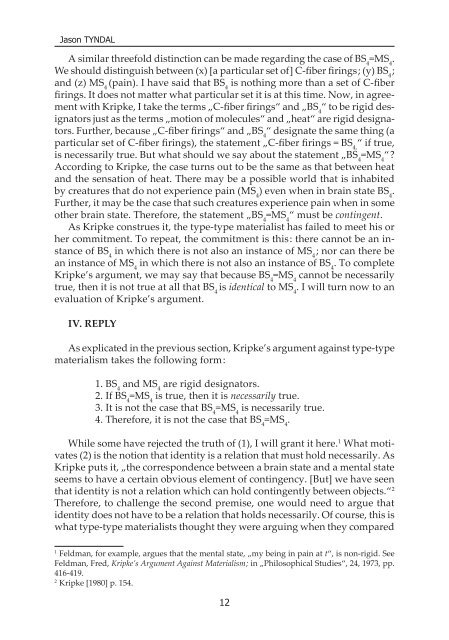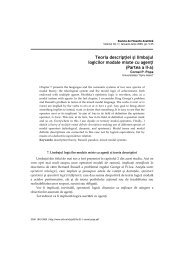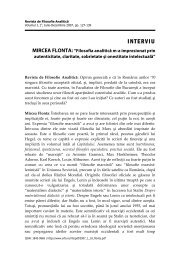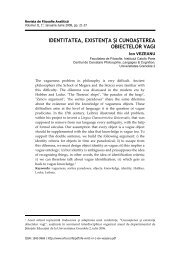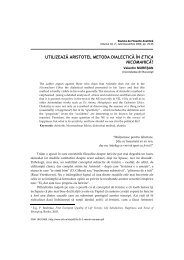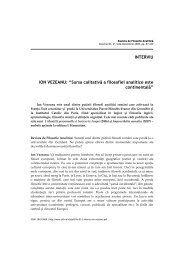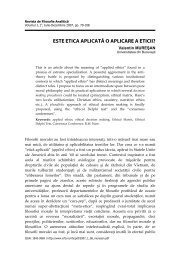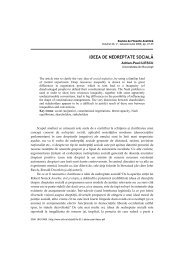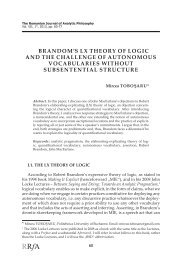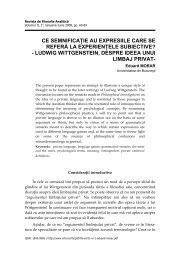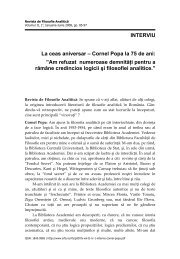AN ANALYSIS OF KRIpKE'S ARguMENT AgAINST THE IDENTITY ...
AN ANALYSIS OF KRIpKE'S ARguMENT AgAINST THE IDENTITY ...
AN ANALYSIS OF KRIpKE'S ARguMENT AgAINST THE IDENTITY ...
You also want an ePaper? Increase the reach of your titles
YUMPU automatically turns print PDFs into web optimized ePapers that Google loves.
Jason TYNDAL<br />
A similar threefold distinction can be made regarding the case of BS 4<br />
=MS 4<br />
.<br />
We should distinguish between (x) [a particular set of] C‐fiber firings ; (y) BS 4<br />
;<br />
and (z) MS 4<br />
(pain). I have said that BS 4<br />
is nothing more than a set of C‐fiber<br />
firings. It does not matter what particular set it is at this time. Now, in agreement<br />
with Kripke, I take the terms „C‐fiber firings“ and „BS 4<br />
“ to be rigid designators<br />
just as the terms „motion of molecules“ and „heat“ are rigid designators.<br />
Further, because „C‐fiber firings“ and „BS 4<br />
“ designate the same thing (a<br />
particular set of C‐fiber firings), the statement „C‐fiber firings = BS 4,<br />
“ if true,<br />
is necessarily true. But what should we say about the statement „BS 4<br />
=MS 4<br />
“ <br />
According to Kripke, the case turns out to be the same as that between heat<br />
and the sensation of heat. There may be a possible world that is inhabited<br />
by creatures that do not experience pain (MS 4<br />
) even when in brain state BS 4<br />
.<br />
Further, it may be the case that such creatures experience pain when in some<br />
other brain state. Therefore, the statement „BS 4<br />
=MS 4<br />
“ must be contingent.<br />
As Kripke construes it, the type‐type materialist has failed to meet his or<br />
her commitment. To repeat, the commitment is this : there cannot be an instance<br />
of BS 4<br />
in which there is not also an instance of MS 4<br />
; nor can there be<br />
an instance of MS 4<br />
in which there is not also an instance of BS 4<br />
. To complete<br />
Kripke’s argument, we may say that because BS 4<br />
=MS 4<br />
cannot be necessarily<br />
true, then it is not true at all that BS 4<br />
is identical to MS 4<br />
. I will turn now to an<br />
evaluation of Kripke’s argument.<br />
IV. REPLY<br />
As explicated in the previous section, Kripke’s argument against type‐type<br />
materialism takes the following form :<br />
1. BS 4<br />
and MS 4<br />
are rigid designators.<br />
2. If BS 4<br />
=MS 4<br />
is true, then it is necessarily true.<br />
3. It is not the case that BS 4<br />
=MS 4<br />
is necessarily true.<br />
4. Therefore, it is not the case that BS 4<br />
=MS 4<br />
.<br />
While some have rejected the truth of (1), I will grant it here. 1 What motivates<br />
(2) is the notion that identity is a relation that must hold necessarily. As<br />
Kripke puts it, „the correspondence between a brain state and a mental state<br />
seems to have a certain obvious element of contingency. [But] we have seen<br />
that identity is not a relation which can hold contingently between objects.“ 2<br />
Therefore, to challenge the second premise, one would need to argue that<br />
identity does not have to be a relation that holds necessarily. Of course, this is<br />
what type‐type materialists thought they were arguing when they compared<br />
1<br />
Feldman, for example, argues that the mental state, „my being in pain at t“, is non‐rigid. See<br />
Feldman, Fred, Kripke’s Argument Against Materialism ; in „Philosophical Studies“, 24, 1973, pp.<br />
416‐419.<br />
2<br />
Kripke [1980] p. 154.<br />
12


